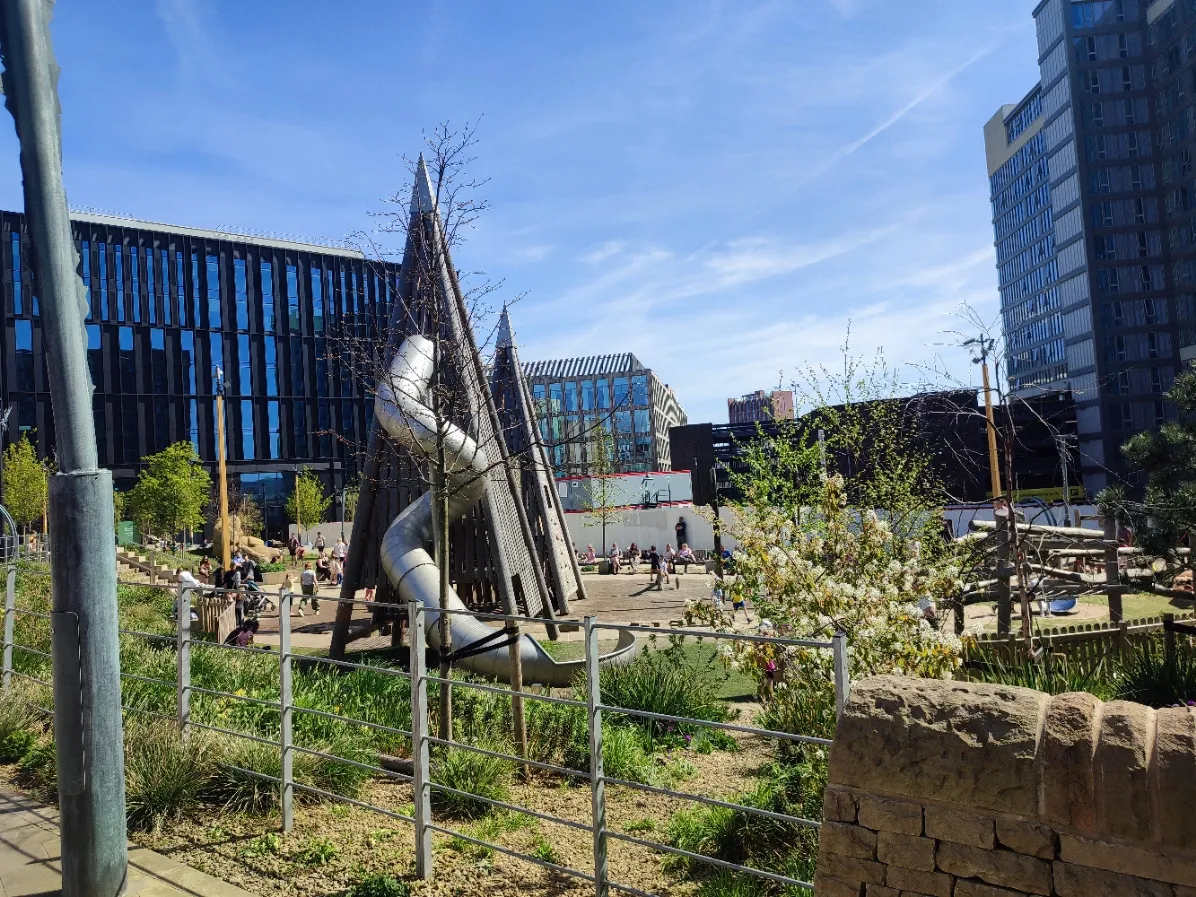Good morning and welcome to this week’s Tribune briefing.
If you like our newsletters, please tell your friends about The Tribune. Just forward this newsletter to them so they can sign up to our mailing list too, or hit the share button below to share the briefing via text or on social media.
Today’s briefing has a story on how Sheffield city centre might reinvent itself for the post-coronavirus world, a look at the latest Covid-19 data and some photos and reaction from Saturday’s second ‘Kill the Bill’ protest in the city.
We also have five things to read from the local and national press, five things to do this week and a mini obituary for a Peak District hero.
If someone forwarded you this newsletter, please join The Tribune’s mailing list to get all our journalism in your inbox.
We had a great response to our Weekend Read about the community gardens of Meersbrook. If you missed that piece, you can find it here. And if you have similar stories about community projects you think we should know about, please just hit reply to this newsletter. One of our aims is to spread good ideas around Sheffield through our journalism, so get in touch about what is happening near you.
The beautiful, uplifting community gardens of Meersbrook by @sheffieldtrib
— Andy Kershaw (@andyksheffield) 12:41 PM ∙ Apr 3, 2021

The Big Story: Could housing save Sheffield city centre?
Top line: After John Lewis’ shock departure, there’s a feeling that Sheffield city centre needs to reinvent itself. An improved retail experience and better cultural facilities are clearly integral to regeneration. But could a renewed focus on housing also be key?
- University of Sheffield academic Tom Hunt certainly thinks so. He says that after the pandemic, Sheffield needs to find new ways to bring people back into the city centre. Tom is the Deputy Director and Policy Research Associate at the Sheffield Political Economy Research Institute.

We quoted one of his tweets in our briefing last week, and then interviewed him in more detail for this week’s newsletter. He told us:
One way to do this is to improve the retail offer, one way is to improve the cultural offer — and another way is to have more people living there.
Key question: What kind of housing? Tom says the type of housing currently being built in the city centre — small flats for a transient population — will never encourage families or older people to live there. As a result, we won’t get long-term, stable populations that build community. The council should instead give developers a ‘clear steer’ for the kinds of accommodation they want to see in the city centre and be more ambitious about the type of housing that is built. Tom says:
When prime sites come up, how do they work with developers to say this is what we would like to see? It feels like it is very much determined by the market and the quickest way for a developer to make money is to build the boxes that we know are problematic.
Re-use, don’t demolish: Repurposing older buildings into accommodation is another option that should also be looked at, he says. Some could even be converted office blocks which are either no longer used or less densely populated.
- If we do that, the planning office needs to enforce high standards, says Tom. Some ‘pretty shoddy practice’ has come from landlords trying to turn a quick profit from refits, he points out.
Lessons from elsewhere: Two French architects recently won the prestigious Pritzker prize for their work repurposing 1960s buildings in Bordeaux city centre, complete with wraparound balconies and winter gardens. Closer to home, Glasgow’s large tenement apartments above retail units could also provide a model to encourage families and older people to live in the city centre.
Discover 10 key projects by Pritzker Architecture Prize-winners Anne Lacaton and Jean-Philippe Vassal: at.dezeen.com/38QHjJk
— Dezeen (@dezeen) 7:30 AM ∙ Mar 19, 2021
What next? The key question is how quickly all this can feed into policy. Tom says it is clear that in the last year, everyone has been thinking more about how people live, work and shop. In this new world, he argues it is legitimate to ask if some currently planned developments are still appropriate or whether bolder visions are required. He told us:
It may be that there is still a need for the offices and flats that were being proposed — but I think there is a moment when it is right for everyone to say, ‘hang on, is that the right plan?’
This week’s weather

Forecast sourced from the Met Office. Location: Sheffield.
Covid-19 Update
Rules: We’re now just a week away from the next phase of the government’s roadmap when hospitality can resume outdoors and non-essential shops can reopen. Boris Johnson will give a speech with more details later today.
Case rate: The rate of new confirmed cases per 100,000 residents is now at 107.7 in Sheffield, still more than double the national average of 47.3. Significantly, the rate for over-60s in Sheffield is now just 42.5, way below the rate for under-60s (125).
Hospitals: The number of Covid-19 patients in Sheffield’s hospitals continues to fall, with only 77 patients currently being treated for the disease in the city (down from 100 last week), including 10 on ventilation (slightly up from 7 last week). Four new deaths linked to the virus have been reported.
Vaccines: As of March 28, 240,107 people in Sheffield had received their first doses of one of the vaccines, well over half the adult population of the city. 12 weeks on from when the first vaccine was rolled out, many are now having their second dose. 275,991 doses have now been given in total.
There has been an increase in cases since schools reopened. This is most likely because we have been looking for cases, finding them early to stop further spread
— SheffieldCityCouncil (@SheffCouncil) 4:20 PM ∙ Apr 2, 2021
There are signs the rate is stabilising amongst children and working age adults
If you have any questions about the latest numbers or would like us to look into a claim you have seen on social media, please just email editor@sheffieldtribune.co.uk.
Report from: The policing bill protest
For the second time in a week, a crowd several hundred strong assembled on Devonshire Green on Saturday before marching through the city centre to protest the government’s controversial Policing Bill, which many fear will curtail the right to protest.

There were more police officers in the city centre than usual, but like last week’s protest, the rally went off entirely peacefully. Journalist Shahed Ezaydi was one of those protesting. She described the bill as “draconian” and said it would affect everyone, but especially those from marginalised groups.
And restaurant manager Sian Moxon, who came with a home-made sign which read “this is what democracy looks like”, said protest was a “fundamental human right”. “Where would we be without that — especially women?” she asked. “If this bill goes through, our democracy will be diminished.”

A Sheffield Against the Policing Bill open meeting will take place on Zoom at 6.30pm on Monday, April 12.
Five things to read
- Bus policy is in the news again after Andy Burnham announced Greater Manchester would adopt London-style bus franchising, ending years of deregulation. Local Democracy Reporter George Torr spoke to Dan Jarvis about the possibility of us following suit. And Now Then magazine also has a good explainer on what the changes would mean for South Yorkshire.
- The original hat-trick hero: In 1858, on a cricket pitch off Manor Oaks Road in what is now the Wybourn estate, the concept of the hat-trick was born. This wonderful Guardian article explains the city’s role in the origin of the feat, when bowler H. H. Stephenson, playing for an England XI against Sheffield side Hallam, took three wickets in three balls, prompting the assembled crowd to have a whip round before giving him the money in a hat.
- Sun sets on steel: Liberty Steel, which employs more than 750 people in Stocksbridge, is on the verge of going bust. This BBC story leads on owner Sanjeev Gupta’s promise that none of the firm’s plants will shut on his watch, but business correspondent Dominic O’Connell says it is clear that time is ticking on the steel magnate’s business empire.
- Salmon return to Don: Last winter, North Atlantic salmon spawned in the River Don in Sheffield for the first time in 200 years. Cleaner water is one reason for the return — but the fish also needed a bit of help getting over a series of industrial weirs which blocked their path. The Sunday Times has a fascinating explainer on how it was done.
- City giants on the slide: Matt Barlow in the Daily Mail has a good, if disheartening, look at the fortunes of Sheffield’s two great football teams. It looks increasingly likely that both teams will be relegated this season, United from the Premier League and Wednesday from the Championship. But as often with the modern game, problems off the pitch are as big a factor as those on it.
Book of the week
Black Car Burning by Helen Mort
Sheffield-born poet Helen Mort’s first novel puts the city of her birth firmly front and centre. From Hillsborough to Page Hall and Ecclesall Road to Stanage Edge, there is barely a part of the city that doesn’t get a mention in this inventively told exploration of complex characters.

The story revolves around three main protagonists: PSCO Alexa who patrols the streets of troubled neighbourhood Page Hall; climbing shop sales assistant Leigh; and a police officer who is haunted by a disaster in his and the city’s past. But the places in the book are clearly as important to the author as the people, with the narrative alternating between her characters’ stories and the thoughts of the landscape itself.
Black Car Burning is available to buy here.
More community gardens?
Following on from our Meersbrook community gardens story on Saturday, another community is planning to turn a spare piece of land into a ‘pocket park’. Organisers are asking for suggestions for what to do with a plot on Frederick Road in Nether Edge, just off Abbeydale Road near the Cole’s Corner record store. Suggestions so far include a new street tree, urban hedgerows or street art.
Newsflash! We are submitting proposals to the council to create a parklet on Abbeydale Rd: a new green space benefiting local businesses, residents and the wider community. But we want your ideas what should go there?! Please tweet us or email abbeydaleroadtrees@gmail.com
— Abbeydale Street Trees (@AbbeydaleTrees) 2:46 PM ∙ Mar 23, 2021
Five things to do
- Penalty of our Paradox: This short by Sheffield-based filmmaker Smart Banda has been created for Historic England’s Future of the High Streets project. The film features an original work by city poet Otis Mensah and the Site Gallery’s Society of Explorers young people’s group, as well as hundreds of black and white photographs of city shops, streets and people. The result echoes the films of French New Wave filmmaker Chris Marker — set to a Steel City rhythm.
- Sheffield Libraries host regular online author talks, with the latest featuring Jini Reddy and her book about the magic of landscape, Wanderland. The Libraries Sheffield blog has previous talks complete with subtitles for a limited time. Available talks include Sheffield academic David Clarke talking about the city’s folklore and a look back on the library’s ‘Rebel Season’ featuring authors David Olusoga, Jacqueline Wilson and Malorie Blackman.
- Museum of You: A lovely idea for the Easter holidays from Museums Sheffield sees their team host a series of Zoom sessions inviting children to create a museum of their own. Participants will act as curator for their own show, collecting items from around their houses before deciding which ones should feature. The sessions are free but you need to book.
- Bracknall: This short, made by and starring Chris McClure (the brother of Reverend and the Makers frontman Jon McClure, who also appears), is the latest episode in the filmmaker’s series about a Sunday league football manager facing a midlife crisis. This edition sees the eponymous coach’s impassioned plea against ‘big money’ investment fall flat after he forgets to unmute himself on Zoom.
- Alfresco art: A bit further afield but the Yorkshire Sculpture Park is open once again after Covid restrictions eased last week. Numbers are strictly controlled and booking is essential.
Mini obituary
Tributes have been paid to Mike Hammond, the former team leader and chairman of Edale Mountain Rescue Team, who died last month aged 83. Originally from Scotland, Mike first came to the Peak District in 1969, and soon after became a member of Edale MRT.

Mike was a pioneer in the use of search dogs in mountain rescue, training his own dog Tess to become the first search dog in the Peak District. In 1977 he also formed the Polar Expedition Group, leading a number of scientific and mountaineering trips to Svalbard in Norway and becoming a Fellow of the Royal Geographical Society.
Edale MRT honorary life member Mick Blood, who knew Mike for almost 50 years, said he was “inspirational”. He described the importance of Mike’s “approach to people, his belief in them and his support and encouragement in helping them achieve great things” as “immeasurable”.
If you enjoyed this newsletter, we’d love you to spread the word about The Tribune by sending it your friends. Simply forward this email or click the share button below.
If you have a story you would like us to look into, hit reply to this briefing or email editor@sheffieldtribune.co.uk.
We are looking for talented local journalists who believe in our mission and want to write for The Tribune. If that’s you, please email us at the email address above.
If someone forwarded you this newsletter, please join The Tribune’s mailing list to get all our journalism in your inbox.

Comments
How to comment:
If you are already a member,
click here to sign in
and leave a comment.
If you aren't a member,
sign up here
to be able to leave a comment.
To add your photo, click here to create a profile on Gravatar.







